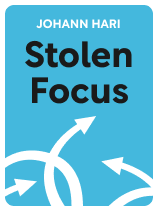

This article is an excerpt from the Shortform book guide to "Stolen Focus" by Johann Hari. Shortform has the world's best summaries and analyses of books you should be reading.
Like this article? Sign up for a free trial here .
What is knowledge overload? Is there too much information for our brains to handle?
In Stolen Focus, Johann Hari identifies seven factors that are contributing to the attention crisis. The sixth factor is knowledge overload, which makes it difficult to focus long enough to process what we’re seeing and hearing.
Keep reading to learn why too much information can actually be hurting you.
The Acceleration of Information
The amount of information available and the speed at which we encounter it are constantly increasing, but our brains can’t keep up. So we jump from one piece of information to the next without focusing. What is the cause of this knowledge overload? Although we tend to blame the internet for this problem, research shows that our inability to concentrate predates technology.
New topics have become popular more and more quickly since at least the 19th century, and the public has lost interest in them at the same speed. Researchers found that topics on Twitter trended for 17.5 hours in 2013 and only 11.9 hours in 2016. Similarly, data from Google books suggests that topics have been falling in and out of popularity more quickly with each passing decade before the internet set the churn rate at maximum speed.
The amount of information available determines the churn rate. The researchers built a mathematical model to determine what caused topics to quickly gain and lose popularity. They discovered a simple answer: When more information is available, people’s capacity to process it diminishes, and they move on to the next thing more quickly.
This acceleration of information is a problem for two reasons:
1) We can’t grapple with or solve complex problems. Since we’re constantly bombarded with new information we can’t keep up with, we have only a superficial grasp of every topic.
2) People with enough resources will find ways to protect themselves from the onslaught of information, such as taking a break from technology with a “digital detox.” Those with fewer resources will continue to be overwhelmed. (Shortform note: Some critics have characterized digital detoxes and similar strategies as privileges, since many people rely on the internet for their livelihood and can’t afford to log off to support their well-being.)
Our Brains Can’t Process All the Information Available
According to Hari, knowledge overload is damaging because our brains are unable to process all of it. There are three main reasons for this:
1) Our brain’s filter is overwhelmed by the amount of information it receives. The brain’s prefrontal cortex filters out unnecessary information but it cannot keep up with the current flow of information. (Shortform note: In Hyperfocus, Chris Bailey argues that your brain’s capacity for creativity depends on the information it receives. The better the information you accumulate, the better ideas you have, so you should be paying attention to only the highest-quality information.)
2) Our brain operates better at a slower pace. Researchers have found that the faster you read, the less information you understand and the more you gravitate to reading easier material. Conversely, slowing down improves your concentration. People who participate in activities that force them to slow down, such as yoga, increase their ability to focus. That’s because they’re retraining their brains to move at a speed that’s suited to their capabilities. (Shortform note: In Blink, Malcolm Gladwell recommends leveraging technology to slow down the flow of information. For example, watch videos in slow-motion to give your brain enough time to process the information.)
3) Our brain has a limited processing capacity. Hari explains that the human brain can only process one or two thoughts at a time. Yet we expect it to process much more than that, such as when we “multitask.” But the best the human brain can do is jump very quickly from one task to another, reconfiguring itself between tasks and having a negative impact on the quality of all the tasks.

———End of Preview———
Like what you just read? Read the rest of the world's best book summary and analysis of Johann Hari's "Stolen Focus" at Shortform .
Here's what you'll find in our full Stolen Focus summary :
- The seven factors causing the current attention crisis
- Johann Hari's three-part solution to gaining your attention back
- Why society needs to change, not just individuals






